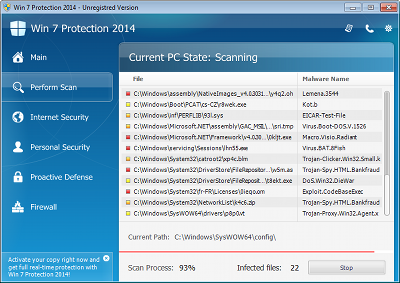Hackers relaunch multi-name rogues to steal people’s money!

Win 7 Antivirus 2014, Vista Antivirus 2014, Win 8 Antivirus 2014, Win 7 Protection 2014, Vista Protection 2014, XP Antivirus 2014, XP Protection 2014, etc. are the latest multi-name rogues that started spreading around just a week ago. They belong to a well-known family of rogue anti-spywares, which is called Braviax, Rogue.FakeRean-Braviax, FakeRean or similarly. All parasites that belong to this family can infiltrate computers unnoticed because their distribution method is closely related to trojans. In order to avoid such infiltration, you should know that the mostly-used method, which is used for spreading them, is fake updates for Java, Flash Player and similar programs. If you see a warning offering you to update any of these applications, you should ignore it and go to the official website of the program if you believe that you need to update something. Also, ignore misleading emails that are full of typo or grammar mistakes because they have also been actively used for spreading these rogues around.
Once installed on computer, these Braviax viruses start their activity: they ‘scan’ the system and then report about various viruses. The most important thing that you have to remember is that these programs have no virus data base, what means that they cannot detect anything. They are designed to display an invented scan of the system and then report about predetermined ‘viruses’. If you would try to check two different computers using Win 8 Protection 2014 or XP Antivirus 2014, you would see that these programs ‘detect’ identical threats.
The clearest sign, showing that your computer was infected, are these and similar alerts that are given below. Undoubtedly, you should ignore them.
Vista Antivirus 2014 has blocked a program from accessing the internet. This program is infected with Trojan-BNK.Win32.Keylogger.gen. Private data can be stolen by third parties, including credit card details and passwords.
System Hijack!
System security threat was detected. Viruses and/or spyware may be damaging your system now. Prevent infection and data loss or stealing by running a free security scan
Win 8 Antivirus 2014 Alert
System Hacked!
Unknown program is scanning your system registry right now! Identity theft detected.
As you may have already understood, the main thing what Win 7 Protection 2014 and other multi-name rogues seek is your money. That’s why they display these constant system scanners and then report about different viruses. Of course, you should never fall for purchasing a licensed version of these programs because your money will be sent straight to hackers. In stead of that, you should waste no time and remove Win 7 Antivirus 2014 or other fake anti-spyware from the system. For that you can use FortectIntego or SpyHunter 5Combo Cleaner.
NOTE! These rogue anti-spywares may block these programs for postponing their removal. In order to overcome this, rename the installer from xxx.exe to xxx.com. If that fails, follow these steps:
1. Reboot your computer to Safe Mode with Networking. Just reboot your PC and, as soon as it starts booting up, start pressing F8 repeatedly.
2. Loggin as the same user as you were in normal Windows mode
3. Now click on IE or other browser and select ‘Run As’ or ‘Run As administrator’, enter your Administrator account password (if needed).
4. Enter this link to your address bar: https://www.2-spyware.com/download/hunter.exe and download a program on your desktop. Launch it to kill the malicious processes of virus and remove its files.

